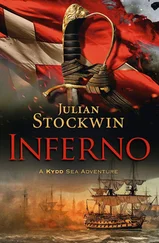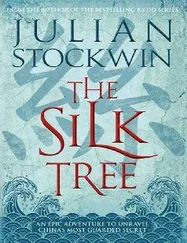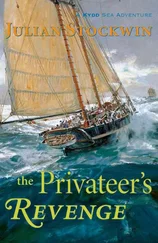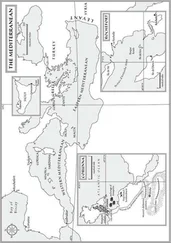Julian Stockwin - 19 The Baltic Prize (Thomas Kydd #19)
Здесь есть возможность читать онлайн «Julian Stockwin - 19 The Baltic Prize (Thomas Kydd #19)» весь текст электронной книги совершенно бесплатно (целиком полную версию без сокращений). В некоторых случаях можно слушать аудио, скачать через торрент в формате fb2 и присутствует краткое содержание. Год выпуска: 2017, Издательство: Hodder & Stoughton, Жанр: Старинная литература, на английском языке. Описание произведения, (предисловие) а так же отзывы посетителей доступны на портале библиотеки ЛибКат.
- Название:19 The Baltic Prize (Thomas Kydd #19)
- Автор:
- Издательство:Hodder & Stoughton
- Жанр:
- Год:2017
- ISBN:нет данных
- Рейтинг книги:3 / 5. Голосов: 1
-
Избранное:Добавить в избранное
- Отзывы:
-
Ваша оценка:
- 60
- 1
- 2
- 3
- 4
- 5
19 The Baltic Prize (Thomas Kydd #19): краткое содержание, описание и аннотация
Предлагаем к чтению аннотацию, описание, краткое содержание или предисловие (зависит от того, что написал сам автор книги «19 The Baltic Prize (Thomas Kydd #19)»). Если вы не нашли необходимую информацию о книге — напишите в комментариях, мы постараемся отыскать её.
19 The Baltic Prize (Thomas Kydd #19) — читать онлайн бесплатно полную книгу (весь текст) целиком
Ниже представлен текст книги, разбитый по страницам. Система сохранения места последней прочитанной страницы, позволяет с удобством читать онлайн бесплатно книгу «19 The Baltic Prize (Thomas Kydd #19)», без необходимости каждый раз заново искать на чём Вы остановились. Поставьте закладку, и сможете в любой момент перейти на страницу, на которой закончили чтение.
Интервал:
Закладка:
Yet of all the bizarre oddities of this campaign none can match that of the lengths to which merchant-ship captains went to get their cargoes through. To circumvent the treasonable act of trading with the enemy, application was made for a private licence to do so. At first issued sparingly, by the end of the war these were turned out by the tens of thousands and were accepted on sight by British cruisers, while false papers were carried to get them into an enemy port. The ‘simulated papers’ were produced by skilled forgers in speciality firms situated in London, the latest information passed on from the Continent, and were so good that before long Lloyds would refuse insurance unless a ship could show a set.
Other scams were introduced: the Danish island of Heligoland, captured by the British, was turned over to the sole industry of cargo laundering where, in an area not much bigger than Hyde Park, colossal amounts of cargo from England were repackaged and re-stowed in a ‘neutral’ ship before being sent into Europe. Napoleon’s officials were helpless to stop this and before long became hopelessly corrupt – Prince Bernadotte considerably helped his offer for the Swedish throne by providing a massive state loan from the proceeds of his involvement. Insurance premiums fell, from 40 per cent when Saumarez first entered the Baltic to the usual two to three per cent when these measures got into their stride.
The French, without command of the sea, found their own ships levied a prohibitive 50 per cent or more and were effectively wiped from the trade routes. Grotesquely they found protection by going as ‘neutrals’ in Saumarez’s convoys and, flourishing genuine papers as simulated ones, they were able to insure their vessels at Lloyds, an English court ruling with impeccable fairness that merely being an enemy did not disqualify them from recovering on a duly accepted policy. It did them little good: under eye they had no chance of loading French export goods and ended taking British goods into the Continent, leading to the established fact that Bonaparte’s troops were clothed and booted on their march to Moscow by the factories of the Midlands.
Great Britain owes more than it realises to Admiral Saumarez. The Baltic trade, the only conduit left to it, would have, if severed, brought about the strangulation of the country and the end of the war. As it turned out, the trade swelled and blossomed and by the end of the war had generated a taste on the Continent for British trade goods that spread far and wide and which, after the war, led to an advantage that left Britain in the Victorian era the greatest commercial nation on earth.
I first came across this great sailor and diplomat while researching Treachery in Guernsey, where the lieutenant governor, Sir Fabian Malbon, was involved in establishing a fund to replace the Saumarez memorial, dynamited during the war by the German Wehrmacht.
To all those who assisted me in the research for this book I am deeply grateful. Particular thanks are due to two people. Eva Hult, archivist at the Maritime Museum in Stockholm, afforded me the great privilege of handling the actual plans of gunboats created by the gifted af Chapman, whose designs dominated the Baltic at the time this book is set. Ulla Toivanen in Finland, in a warm gesture from a stranger, readily shared insights into her country’s culture and history.
I visited many splendid museums in the Baltic region as part of the preparation for this book – but the Estonian Maritime Museum in Fat Margaret Tower, Tallinn, only an hour from Rågervik, stood out, providing a wealth of information.
My appreciation also goes to my agent Isobel Dixon, my editor at Hodder & Stoughton Oliver Johnson, designer Larry Rostant, for his superb cover design, and copy editor Hazel Orme.
And, as always, my heartfelt thanks to my wife and literary partner, Kathy.
Glossary

akvavit
a clear liquor flavoured with caraway seeds much esteemed by Scandinavians
a-low
the opposite of aloft
barkers
slang for firearms
blaggard
‘blackguard’
breeches
garment worn by gentlemen before pantaloons and ending at the knee
burgoo
porridge
Carrick bend
a knot to join two hawsers when intended to render around a capstan
chouse
make sport of
coach
that part of the captain’s quarters aft used as an office
colours
the distinguishing national ensign flown by a ship
conn
the men and equipment responsible for directing the ship on her course
Continental System
a system of economic warfare, essentially a blockade of Europe against the British by Bonaparte
Cyrillic
alphabet of the Slavic tongues
dame school
basic village school run by a lady of mature years
deal
a length of timber ready planed and finished in use for a building
dirk
a small poignard modelled after the Scottish dirk and worn by midshipmen in place of a full-sized sword
division
the sectioning of a warship’s company into a self-sufficient unit for special duties or combat
dog watches
in the Royal Navy a half-watch about sunset to give an uneven number of watches to be served at different times
douanier
French Customs official
double tides
working all day long, i.e. for both tides instead of one
figgy duff
pudding made with suet and raisins
fish-scut
the faeces of fish
flam
to trick
footling
trivial
glacis
a slope extending down from a fortification to slow an assault
griff
how things are done
gunwale
the uppermost strake of a boat
gyre
a swirling vortex; that which causes gyrations
Holger Danske
legendary Danish hero who sleeps in the crypt of Kronborg Castle ready to rise when Denmark is in peril
hove to
result of a manoeuvre to halt a vessel by backing its sails
Johnny Raw
a new-pressed or joined sailor on his first trip to sea
jolly boat
smallest boat aboard used for casual duties
kanonchalup
the larger type of gunboat. Armed with two 24-pound cannons and four four-pound howitzers; seventy men
kanonjolle
the smaller type of gunboat with one 24-pound cannon and two four-pound howitzers; forty men
Kem
mayor of Russian town in imperial times
Kronstadt
main island base of Russian Navy, to seaward of St Petersburg
larbowlines
those men in the larboard watch
League of Armed Neutrality
early attempt of neutrals to combine to resist British searches for contraband on the high seas
lee shore
downwind from the vessel, dangerous in bad weather
lop
small wave with enough curl to cause cresting
mole
a long pier made of masonry to form and protect a harbour
mountebank
a flamboyant charlatan
negus
a hot toddy of wine and lemon
noon sight
the midday reading of the apparent altitude of the sun to derive latitude
pawky
derisively small
perruquier
wig-maker
pinnace
carvel-built boat smaller than a cutter used for communication between ships
Pomor
medieval-origin Russian settlers in the extreme north
powder monkey
seaman, usually a youngster, carrying powder from the magazine to the gun
quoin
wedge-shaped piece of wood to raise or lower the breech of a gun to give elevation or depression
rake
the firing into an enemy down the length of a ship instead of into the side
ratlines
Читать дальшеИнтервал:
Закладка:
Похожие книги на «19 The Baltic Prize (Thomas Kydd #19)»
Представляем Вашему вниманию похожие книги на «19 The Baltic Prize (Thomas Kydd #19)» списком для выбора. Мы отобрали схожую по названию и смыслу литературу в надежде предоставить читателям больше вариантов отыскать новые, интересные, ещё непрочитанные произведения.
Обсуждение, отзывы о книге «19 The Baltic Prize (Thomas Kydd #19)» и просто собственные мнения читателей. Оставьте ваши комментарии, напишите, что Вы думаете о произведении, его смысле или главных героях. Укажите что конкретно понравилось, а что нет, и почему Вы так считаете.










